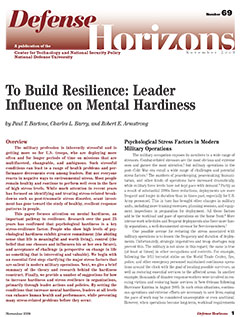DOWNLOAD PDF
 Overview
Overview
The military profession is inherently stressful and is getting more so for U.S. troops, who are deploying more often and for longer periods of time on missions that are multifaceted, changeable, and ambiguous. Such stressful conditions can lead to a range of health problems and performance decrements even among leaders. But not everyone reacts in negative ways to environmental stress. Most people remain healthy and continue to perform well even in the face of high stress levels. While much attention in recent years has focused on identifying and treating stress-related breakdowns such as post-traumatic stress disorder, scant investment has gone toward the study of healthy, resilient response patterns in people.
This paper focuses attention on mental hardiness, an important pathway to resilience. Research over the past 25 years has confirmed that psychological hardiness is a key stress-resilience factor. People who show high levels of psychological hardiness exhibit greater commitment (the abiding sense that life is meaningful and worth living), control (the belief that one chooses and influences his or her own future), and acceptance of challenge (a perspective on change in life as something that is interesting and valuable). We begin with an essential first step: clarifying the major stress factors that are salient in modern military operations. Next, we give a brief summary of the theory and research behind the hardiness construct. Finally, we provide a number of suggestions for how to increase hardiness and stress resilience in organizations, primarily through leader actions and policies. By setting the conditions that increase mental hardiness, leaders at all levels can enhance human health and performance, while preventing many stress-related problems before they occur.
READ MORE >>